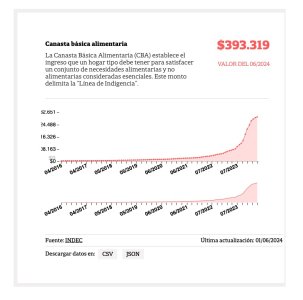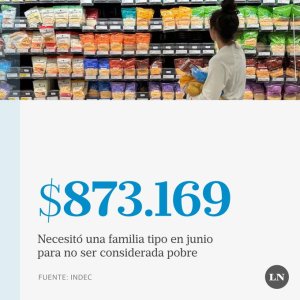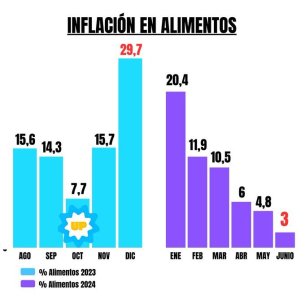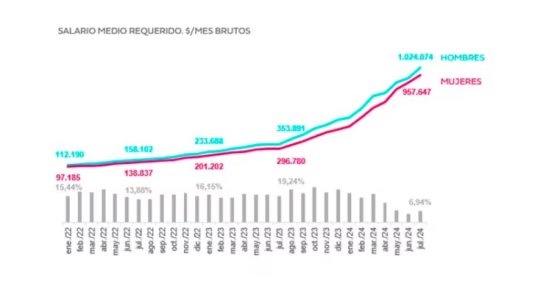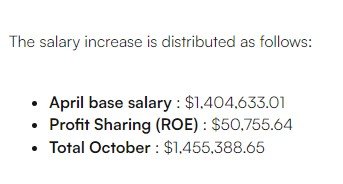The salaries here are really low. According to this it would make salaries on average about $600 USD per month? My girlfriend said besides people that are super educated and maybe working for a remote job, most don't make much here at all. I read this post the other day and I was shocked. Are salaries really that low and jobs that difficult to come by? Here is what he posted as an expat living here 18 years. I was SHOCKED to hear that median income here is only about $400 USD per month. That seems low but I guess there are a ton of people making next to nothing but even maids I think would earn more than this?
He is saying his daughter has an international business degree and making $1,200 USD per month but it's working for an American company.
Speaking as an expat who has lived in Argentina for 18 years (and still do), I have a few comments:
1) I hope he earns in Dollars somehow, or is wealthy (an ex-cop?).
The Peso has gone up to 1440 to 1 Dollar right now. The median income here is about the equivalent of $400 USD per month. But at least inflation on food and beverages is down to about 2% - per month.
I have one daughter, who graduated college a couple of years ago (international business degree) and is making about $1200 USD/month - working for a US company. She has one of the best jobs I know of.
I have another daughter who went through school (political science) who worked for a congressional representative but was laid off because Milei is cutting govt jobs (and I support what he is doing!). She's been looking for a "regular" job that pays more than when she was the representative's assistant, which was about $200 USD/month. She's been looking for about 4 months.
I have another daughter who hasn't gone to college, was hoping to get a job cooking. Best jobs there are about $250 USD/month (and 7 days a week, 6 if the place closes for a day) unless you are an actual chef - and then there is a long line. She is working to take care of elderly people for about $150 USD/month (though part time) while we work on opening a fast food or bakery delivery. "Buying her a job."
There a few, to no, opportunities here.
2) I hope he's planning on homeschooling his kids.
All three daughters have been through school here, at least to high school. School is a joke here, even private schools, unless you pay for the highest private schools, which are fairly expensive. Even poor people here pay for private schools, as bad as they are, because public schools are worse.
They are actually worse than US schools, and I don't see that changing any time soon. I can provide specifics if anyone is interested.
3) Even earning dollars and bringing them here: Hopefully Milei will change that, but he still has a long way to go. Right now the official rate is actually 890 pesos to the dollar. The rate I mentioned above is called the "blue rate", which is a type of black market money changing rate. Western Union actually sends money here at close to the blue rate, but credit cards and debit cards are mostly at an intermediary rate, probably around 1200-1. There are something on the order of 14 different exchange rates, depending on what part of the economy.
The Central Bank here may withhold 30% of any transfers or at best it takes a month or two to accredit the money in your account (I used to lease programmers here, but gave it up because of the Central Bank). At least, that's how it used to work. Milei may have made progress on this.
To get my money here (no way I could survive on a job earning in pesos), I still use a method of locals here who operate with cryptocurrencies to bring down money here for me - for a 3% charge (cheaper than Western Union, though, and they give it to me in Dollars, I don't have to worry about inflation - as long as the government doesn't mess with the black market, which they have in the past, then it gets real expensive to live here)
4) Import tariffs are about 50% of the cost of most items here, particularly electronics. Get used to going to other countries to buy some things and bring them in. Note: Amazon doesn't deliver here (at least for almost everything I've looked at).
5) If he rents an apartment here, he will either have to rent a BnB-style place or have someone that can loan him the title to a real property as a guarantee, to make the lease. Leasing here is complicated, hopefully Milei improves this, and I can expound on this for anyone who is interested.
I ended up leasing what used to be a beauty salon and building it out with rooms and an office for me, because the guy who was offering it to rent is OK with doing things "on the side". Not easy to do.
I've had leases with real apartments and even a house outside the city years ago when it was easier, but still had to put thousands of dollars down for deposits and buy a guarantee.
-----------------
Personally, I'm optimistic about Argentina over the long run - as long as the reforms continue. But Argentina has a history of up and down cycles. I hope this stops and Argentina moves forward with Milei, but I'm not holding my breath.
I've spent a fortune educating our daughters and providing them a platform from which to launch. When Milei became president, I did buy land because I think it will be worth quite a bit in the future. I have had a business here in the past but had to shut down because of overwhelming tax and regulatory burden. I am thinking about opening another now that Milei is president.
Argentina hasn't been "socialist" for the past 100 years. It has actually been fascist. Juan Peron brought fascism here in 1946 when he became president. He studied with Mussolini in the 30s. "Peronism" is a concept that runs deep in Argentinos here and infects everything.
The government, up until now at least, has a contract for everything and no one can make a contract that is in opposition to the government contract. Housing, labor, sales - you name it. You can have a contract that adds something, but anything in a contract that you sign, that is against the government contract, is null whether agreed to by parties or not.
Argentina has been socialist - on top of fascist! - for the last 16 years or so. That has made things even worse.
The truth is, there has been so much damage here that it will take decades before Argentina is a place of opportunity.


